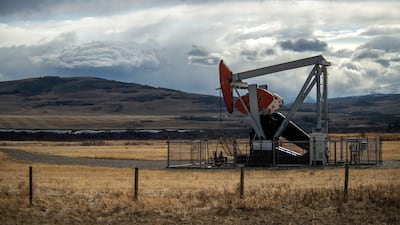Oil prices rose on Tuesday after Saudi Arabia, the world’s largest exporter of crude, said the Opec+ group can cut output if required to deal with the current volatility in oil markets.
Brent, the global benchmark for two-thirds of the world's oil, was trading 1.41 per cent higher at $97.84 a barrel at 3.47pm UAE time. West Texas Intermediate, the gauge that tracks US crude, was up 1.66 per cent at $91.86 a barrel.
Prince Abdulaziz bin Salman, Saudi Arabia's energy minister, in an interview with Bloomberg on Monday, said Opec and its allies "have the commitment … and the means” to deal with volatility on prices and “provide guidance including cutting production at any time and in different forms”.
The supergroup of 23 producers led by Saudi Arabia and Russia, agreed to increase output by 648,000 barrels per day in July and August as they fully unwind nearly 10 million barrels per day of cuts implemented in May 2020 to counter the demand slump caused due to the coronavirus pandemic.
Opec+, which will meet on September 5 to assess the oil market, agreed earlier this month to raise production by another 100,000 bpd next month amid pressure from major consumers, including the US, to cool prices.
However, oil has given up most of its gains since then amid mounting concerns over the possibility of a looming global recession hitting fuel demand. Last month, the International Monetary Fund lowered its growth forecast for the global economy to 3.2 per cent this year, from its previous forecast of 3.6 per cent in April. This was based on factors such as Russia’s war in Ukraine, high inflation and the Covid-19 pandemic.
The “extreme volatility” and the “thin liquidity” prevailing in the oil market have also adversely affected the smooth operations of the industry and led to increased risks and uncertainty, Prince Abdulaziz said, adding Opec+ will soon “start working on a new agreement beyond 2022 which will build on our previous experiences, achievements and successes".
Thin liquidity refers to a market characterised by a smaller number of buyers and sellers but a high price volatility.
These factors have undermined the market’s “essential function of efficient price discovery and have made the cost of hedging and managing risks for physical users prohibitive”, he said.
It has also negatively affected commodities, creating new types of risks and insecurities.
“This vicious circle is amplified by the flow of unsubstantiated stories about demand destruction … return of large volumes of supply … and uncertainty about the potential impacts of price caps, embargoes and sanctions,” Prince Abdulaziz said.
Volatility is detrimental because “without sufficient liquidity, markets can’t reflect the realities of the physical fundamentals in a meaningful way and can give a false sense of security at times when spare capacity is severely limited and the risk of severe disruptions remains high”, he said.
Oil prices have remained extremely volatile this year amid supply concerns following Russia’s invasion of Ukraine, growing recession fears hitting fuel demand and the possibility of Iran, an Opec member, boosting supply, as talks continue among major world powers to revive the 2015 nuclear deal and provide sanctions relief to Tehran.
“At this point, the only hope is to see the Iranian oil hit the market again,” said Ipek Ozkardeskaya, a senior analyst at Swissquote Bank.
“If the US and Iran could agree on a nuclear deal, Iran could increase its daily oil production to around 4 million bpd, which could give a much-needed relief to the market.”
Brent nearly touched $140 a barrel in March, shortly after Russia’s military offensive in Ukraine, but fell in the subsequent months amid recession fears.


